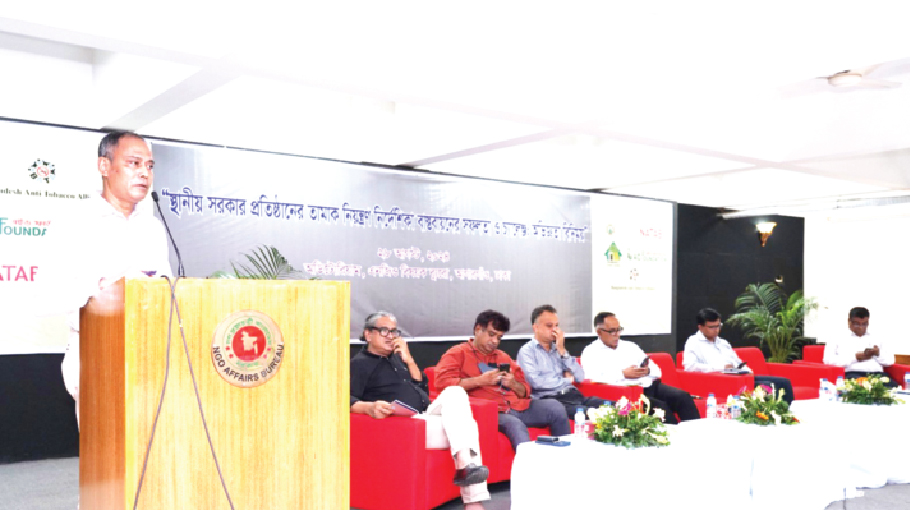Experts for proper implementation of Govt guidelines for public health

Public health experts at a views-exchange meeting on Wednesday called upon the government to implement guidelines, rules and regulations formulated by the government properly in order to protect public health.
Speaking at the event, some government officials said that various ministries, departments and local government bodies along with non-government organisations and civil society are working together to protect public health in the country.
The views-exchange meeting on ‘Challenges and Successes in Implementing the Tobacco Control Implementation Guidelines for Local Government Institutions’ took place in the auditorium of NGO Affairs Bureau at Agargaon in the capital. Bangladesh Anti-Tobacco Alliance (BATA), AID Foundation, Gram Bangla Unnoyon Committee, NATA and WWB Trust jointly organised the event.
The speakers of the event said the Ministry of Local Government, Rural Development and Cooperatives formulated the Tobacco Control Implementation Guidelines for Local Government Institutions to strengthen the tobacco control activities in the country in order to protect public health. The initiative has been established as an exemplary example globally. Through this guideline, it will be possible to take effective measures to control tobacco in institutions under the ministry, they added.
It was said that various ministries, non-government organisations and civil society together with local government bodies have already taken joint initiatives to control tobacco. As a result of these activities, the local government institutions have taken effective steps to control tobacco and have taken a step forward in making a tobacco-free Bangladesh.
Saidur Rahman, director general of NGO Affairs Bureau, was present as the event as the chief guest with Saifuddin Ahmed, coordinator of Bangladesh Anti-Tobacco Alliance (BATA); in the chair.
Syeda Anonna Rahman, project head of WBB Trust; moderated the event, while Md Akhtar Uz Zaman, coordinator (joint secretary) of National Tobacco Control Cell (NTCC); Md Anwar Hossain, director of NGO Affairs Bureau; Moinul Islam of the NGO Affairs Bureau; Syed Mahbubul Alam Tahin, senior technical consultant at Vital Strategies; Torikul Islam Polash, CEO & founder of AID Foundation; and Abdus Salam Miah, program manager of CTFK; took part in the discussion as panel discussants.
The speakers called for spending the health promotion surcharge on tobacco in anti-tobacco awareness activities. A request was made to the NGO Affairs Bureau to disallow the expenditure of tobacco company money on any development project. In addition to jobs, it is important to give priority to non-smoking candidates in the election of public representatives. Also, tobacco control should be included in various educational training workshops and anti-drug activities. The media workers are invited to regularly publish news on tobacco control issues.
Presenting the keynote, Shagufta Sultana, project director of AID Foundation; said that the AID Foundation, in collaboration with local government division and ministries, is working to implement tobacco control guidelines in nine municipalities. They provided technical support in monitoring, evaluation and capacity building of tobacco control programmes in 100 municipalities. The AID Foundation worked closely with MAB and the Mayors Alliance for Healthy Cities to connect with 100 mayors. A total of 22 municipalities have adopted guidelines in light of FCTC’s Article 5.3. Allocations have been initiated to local organisations to sustain tobacco control activities.
In 2023, training was provided to 66 local organizations belonging to the Bangladesh Anti-Tobacco Alliance (BATA) to implement the tobacco control model program adopted by the National Institute of Local Government (NILG). The WBB Trust has been involved as an expert in this program. After the training, the organizations are helping to implement tobacco control programs by establishing direct contact with public representatives. Already, 50 local organizations have jointly worked with local government institutions and taken various steps.
It is noted that a total of 5,455 letters were sent to public representatives by WBB Trust requesting budget allocation for tobacco control activities. Pursuant to the letter, 19 Union Parishads and five Municipalities pledged to allocate budget for tobacco control. In addition, for the first time in Bangladesh, six public representatives allocated funds to six non-government organizations to implement tobacco control programs.
NATB and local organizations are implementing tobacco control programs in three city corporations and nine municipalities of Dhaka and Mymensingh divisions. A total of 220 tobacco outlets were brought under compulsory licensing. Besides, operation of 64 mobile courts, collection of information from 3243 sales outlets and removal of tobacco sales outlets within 100 meters were taken in the working area. In addition, sanitary inspectors removed 6908 tobacco advertisements and 2347 sales outlets received licences.




